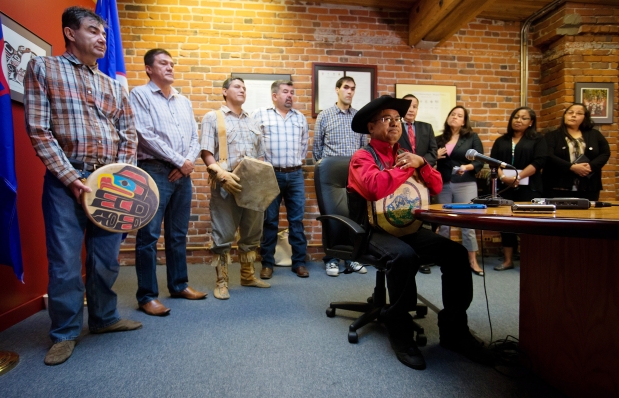Opinion: Tsilhqot’in Nation decision: a bellwether for real reconciliation
Friday, August 08, 2014
Vancouver Sun

Court ruling paves way for all nations to travel
During the short history of British Columbia, First Nations have continually stated a fundamental truth: the beautiful and bountiful land and waters of our respective territories is our home and we have legitimate legal rights and title to this land. Yet it seems even today this truth has yet to be fully accepted.
The Crown asserted sovereignty in 1846 and since then, the official line of governments has been one of denial and minimizing: that First Nations never owned land nor exercised their laws over their lands. In modern land claims negotiations, the standard land and cash equivalency offers by the Crown amount to about five per cent of our territory; this is like taking possession of a house and acreage and then offering the legitimate landowner one of the closets in the basement to live in.
For more than 160 years, we sent delegations to England, Victoria and Ottawa, denounced the racist policies and legislation of successive governments, endured residential schools and eventually sought acknowledgment of our rightful claims in the courts.
The Supreme Court of Canada’s recognition of the territorial aspect of our aboriginal title, and the declaration of aboriginal title for the first time in Canadian history, to a part of the Tsilhqot’in homeland, is a wakeup call to everyone. The game has changed and the era of Crown denial of our peoples’ legal rights to our lands and territories is over.
A recent op-ed piece (Robin Junger, McMillan LLP, “Why Supreme Court’s Tsilhqot’in land title decision is no game changer,” Vancouver Sun, July 17), attempts to dismiss and minimize what this ruling means and what its implications are.
The Supreme Court has moved us beyond the status quo, and to ignore the intent of the Supreme Court ruling to maintain the status quo is at everyone’s peril in the long run.
Junger, based on a dismissive reading of the historic Tsilhqot’in Nation judgment that borders on delusional, argues it is no game changer and counsels the government of British Columbia to essentially stick its head even more firmly in the sand. It is worth noting that Junger’s law firm, McMillan, represented Taseko Mines in two dismal failures for approval of the Prosperity Mine Project in Tsilhqot’in territory. Taseko took an equally dismissive approach to aboriginal rights and the devastating cultural effects of its proposed project.
The B.C. provincial government might want to think long and hard about how this sort of failed strategy worked before it considers this approach as a blueprint for future relations with First Nations.
The way forward? The Supreme Court stated a profound yet simple solution that supports modern development and provides certainty while our aboriginal title claims are fully and fairly resolved: obtain the free, prior and informed consent of First Nations for any and all proposed land and resource development projects throughout the entire territory, not just in areas where we have fought for recognition in the courts.
The Tsilhqot’in Nation ruling focuses the real debate on consent. To incorporate consent into the way in which governments operate is a path to avoid countless new court cases, decades of deepening uncertainty and risky investment in British Columbia. For First Nations this is not about separating from Canada, but rather about obtaining recognition as legitimate governments and landowners with a say in what happens in our homes.
Obtaining the consent of First Nations is not as complicated and problematic as many make it out to be. For example, the Tsilhqot’in’in National Government is introducing its mining policy, which at its core is about how to obtain our government’s consent for projects, so developers and First Nations can work together creatively to advance ecologically and culturally acceptable projects.
We hope that now, after this Supreme Court ruling real, genuine and lasting reconciliation will be the order of the day. After a long and unfortunate era of Crown denial, we have an opportunity in this province, to start a new chapter together, one that recognizes the diversity and richness of First Nations in this province and everything we have to contribute to our collective way forward.
We have waited a long time for this day. We are ready to grasp this opportunity, an opportunity that not only will benefit our nations but British Columbia and our country as a whole. The real question is whether government and industry have the leadership and vision to join us.
Joe Alphonse is the Tribal Chair of the Tsilhqot’in National Government, and the elected Chief of Tl’etinqox, the largest of the six Tsilhqot’in communities that together comprise the Tsilhqot’in Nation. Roger William is the elected chief of the Xeni Gwet’in First Nations Government and was the plaintiff in the Tsilhqot’in vs. British Columbia title case.
Photo:Chief Roger William, right, of the Xeni Gwet’in First Nation, is flanked by chiefs and other officials during a news conference in Vancouver, after the Supreme Court of Canada ruled in favour of the Tsilhqot’in First Nation, granting it land title to 438,000-hectares of land on Thursday June 26.


